Many Chinese phrases sound simple but carry deeper meaning. In this guide, we’ll break down 20 Common Chinese Phrases Foreigners Always Get Wrong (And What They Really Mean) so you can avoid missteps and speak naturally.This guide unpacks 20 commonly misunderstood expressions—from “我看看” to “你可真是的”—so you can speak naturally and avoid awkward mistranslations.
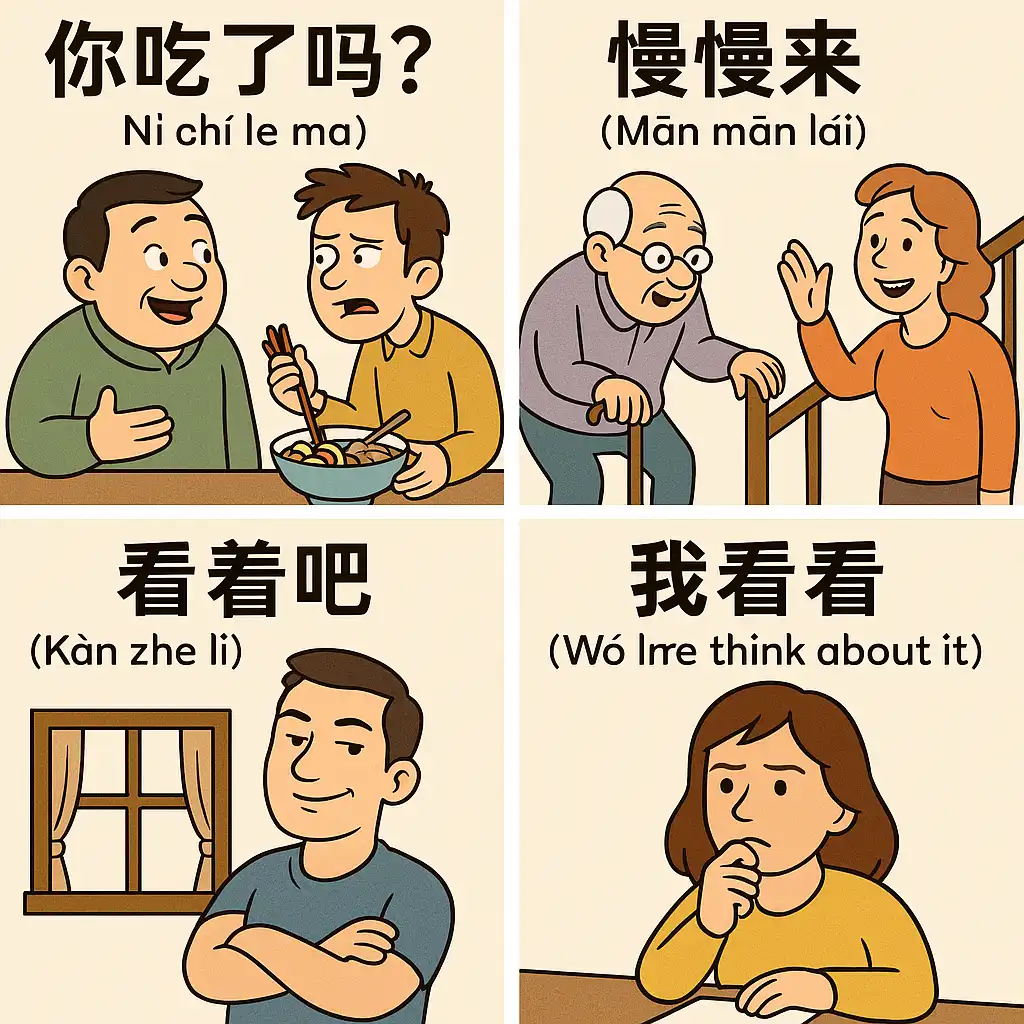
1. “你吃了吗?” (Nǐ chī le ma?)
Literal translation: Have you eaten?
What it really means: This is a casual greeting, much like “How are you?”
While it may sound like someone’s checking on your lunch schedule, it’s often used as a friendly way to start a conversation. It’s rarely meant as a literal question.
2. “慢慢来” (Màn man lái)
Literal translation: Come slowly
What it really means: Take care, go safely
Commonly heard when someone is leaving, this phrase shows care and politeness. It’s often mistranslated as a comment on someone walking too fast.
3. “看着力” (Kàn zhe lì)
Literal translation: Look at the strength
What it really means: Let’s see how things go
Used to suggest that outcomes depend on future developments, it’s similar to saying “Time will tell.”
4. “我看看” (Wǒ kàn kan)
Literal translation: I take a look
What it really means: Let me think about it
In total, this is one of the most misunderstood phrases in business settings. It implies hesitation or pending consideration, not curiosity.
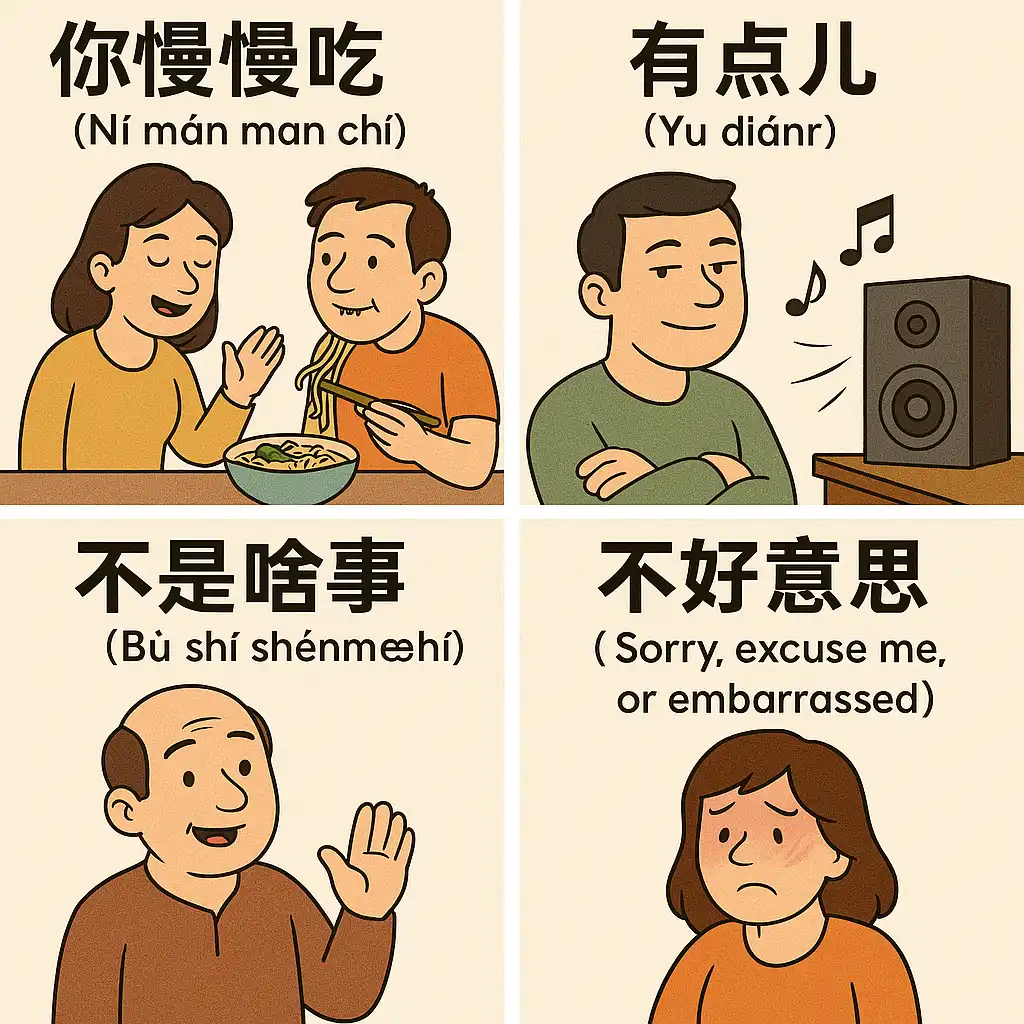
5. “你慢慢吃” (Nǐ màn man chī)
Literal translation: You eat slowly
What it really means: Enjoy your meal
On average, learners tend to over-literalize this phrase. It’s a polite gesture, not a critique of eating speed. It’s just one example from the list of 20 Common Chinese Phrases Foreigners Always Get Wrong (And What They Really Mean). While learners often take it literally, the phrase is a polite way to say “Enjoy your meal.”
6. “有点儿” (Yǒu diǎnr)
Literal translation: Have a little
What it really means: Slightly or a bit too much
Depending on context and tone, it may carry a negative nuance—as in “a bit noisy” or “a bit annoying.”
7. “不是啥事” (Bù shì shénme shì)
Literal translation: It’s not a thing
What it really means: It’s no big deal
Foreigners often misunderstand this as a denial. In general, it’s used to downplay a problem or show modesty.
8. “不好意思” (Bù hǎo yìsi)
Literal translation: Not good meaning
What it really means: Sorry, excuse me, or embarrassed
This common phrase is a general rule for expressing mild regret or politeness.
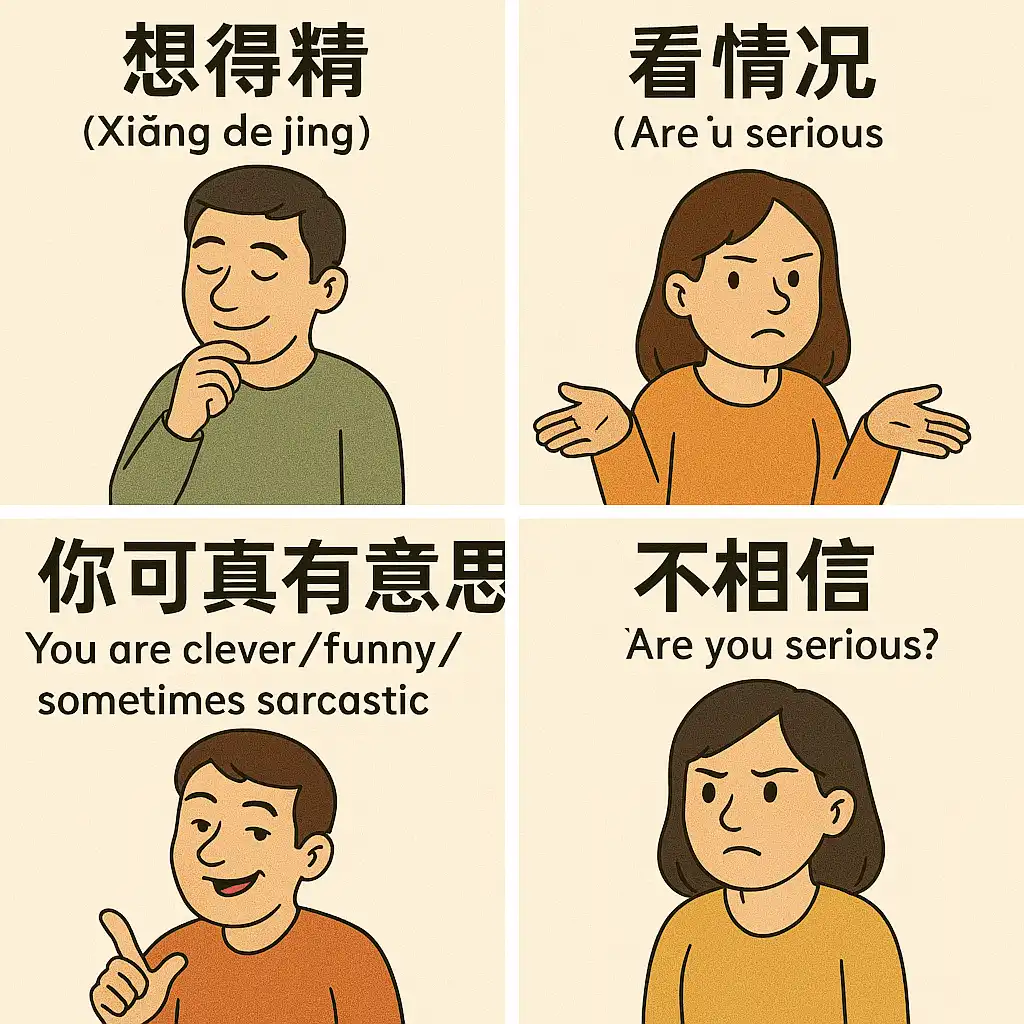
9. “想得精” (Xiǎng de jīng)
Literal translation: Think meticulously
What it really means: Be very thoughtful or considerate
Often used as a compliment, it praises someone’s detailed thinking.
10. “看情况” (Kàn qíngkuàng)
Also belongs to the 20 Common Chinese Phrases Foreigners Always Get Wrong (And What They Really Mean) because its meaning isn’t about observation—it’s the flexible “it depends.”Literal translation: Look at the situation
What it really means: It depends
A classic Chinese phrase that reflects flexibility and pragmatism. Foreigners often expect a definite answer but get this instead.
11. “你可真有意思” (Nǐ kě zhēn yǒu yìsi)
Literal translation: You are very interesting
What it really means: You are clever/funny/sometimes sarcastic
Depending on tone, it could be either a compliment or gentle sarcasm.
12. “不相信” (Bù xiàngxìn)
Literal translation: Not believe
What it really means: Are you serious?
Sometimes said in disbelief or playful doubt, not as direct distrust.
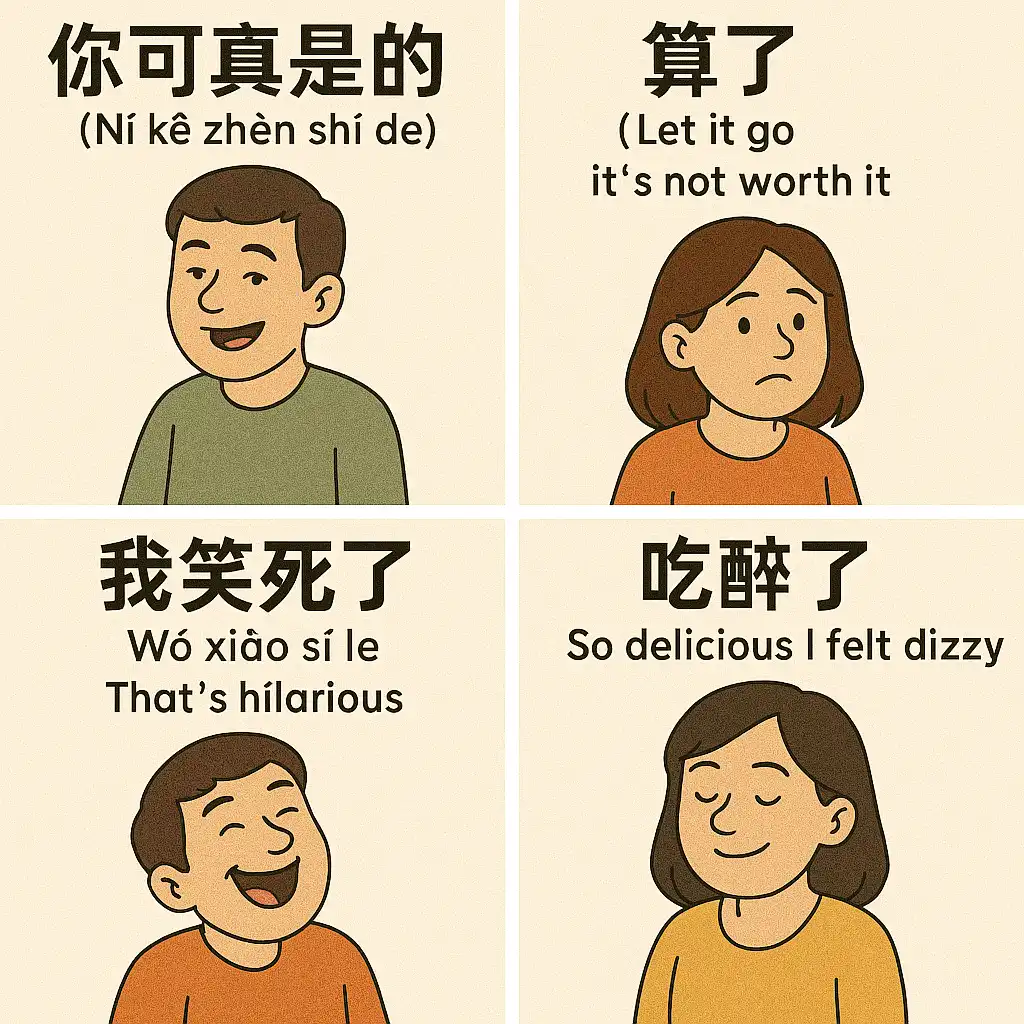
13. “你可真是的” (Nǐ kě zhēn shì de)
Literal translation: You really are something
What it really means: (sarcastic or amused) Wow, you really did that
Tone is everything here. As a whole, this is a tone-dependent phrase often misread.
14. “罢了” (Suàn le)
Literal translation: Forget it
What it really means: Let it go, it’s not worth it
Used to de-escalate or withdraw from a topic. Often mistaken for being dismissive.
15. “我笑死了” (Wǒ xiào sǔ le)
Literal translation: I laughed to death
What it really means: That’s hilarious
Exaggeration for effect, just like “I’m dying laughing” in English.
16. “吃醉了” (Chī zuì le)
Literal translation: Ate to drunkenness
What it really means: So delicious I felt dizzy
Describes a food high that leaves one giddy or overly satisfied.
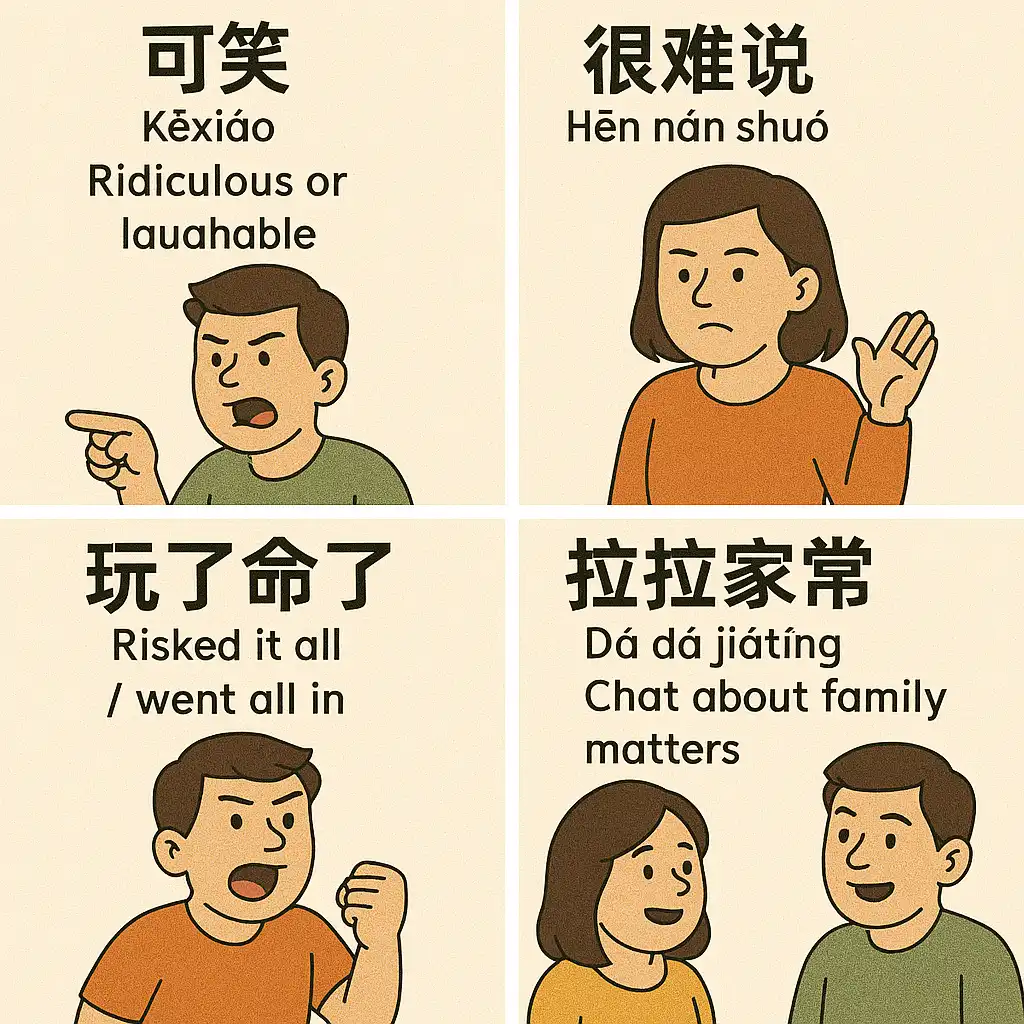
17. “可笑” (Kěxiào)
Literal translation: Can laugh
What it really means: Ridiculous or laughable
On average, this is used for mocking or scorn. Not always a compliment.
18. Tricky Chinese Phrases: “很难说” (Hěn nán shuō)
Literal translation: Very hard to say
What it really means: It’s uncertain
This phrase is often a polite way to avoid saying “I don’t know” or to express that a situation is complicated.
19. “玩了命了” (Wán le mìng le)
Literal translation: Played with life
What it really means: Risked it all / went all in
In total, this phrase conveys intense effort or recklessness. Mistranslation often misses the dramatic flair.
20. “打打家庭” (Dǎ dǎ jiātíng)
Literal translation: Hit the family
What it really means: Chat about family matters
Despite the violent literal translation, it refers to catching up or having a heart-to-heart conversation.
Free Resources to Expand Your Chinese Phrase Vocabulary
If you want to go beyond these 20 Common Chinese Phrases Foreigners Always Get Wrong (And What They Really Mean), here are some excellent free tools:
- Arch Chinese – structured vocabulary lists with pinyin and stroke order
- YellowBridge – idioms and sample sentences for real usage
- LINE Dictionary – quick lookups with audio recordings
- Pleco App – free mobile dictionary where you can build your own phrase bank
For more structured study:
- HSK Vocabulary Lists – official word lists by level
- Chinese Grammar Wiki – grammar explanations with everyday phrase examples
- BBC Languages – Chinese – archived, but still packed with useful beginner phrases
👉 These resources let you practice widely used expressions while reinforcing the cultural nuance that makes Chinese so unique.
These phrases illustrate how literal translation often fails to capture cultural meaning. For learners of Chinese, recognizing tone, idiom, and social context is essential.
As a general rule, always ask a native speaker if you’re unsure how a phrase should be used—because in language, what’s said is often less important than how it’s meant.
Need expert help with Chinese translation? Whether it’s everyday phrases, official documents, or business content, I provide accurate, culturally aware translations that save you from embarrassing mistakes. Get in touch today and make your Chinese communication clear and natural.
High-Stakes Chinese Translation: 8 Types of Documents That Are Risky to Translate
